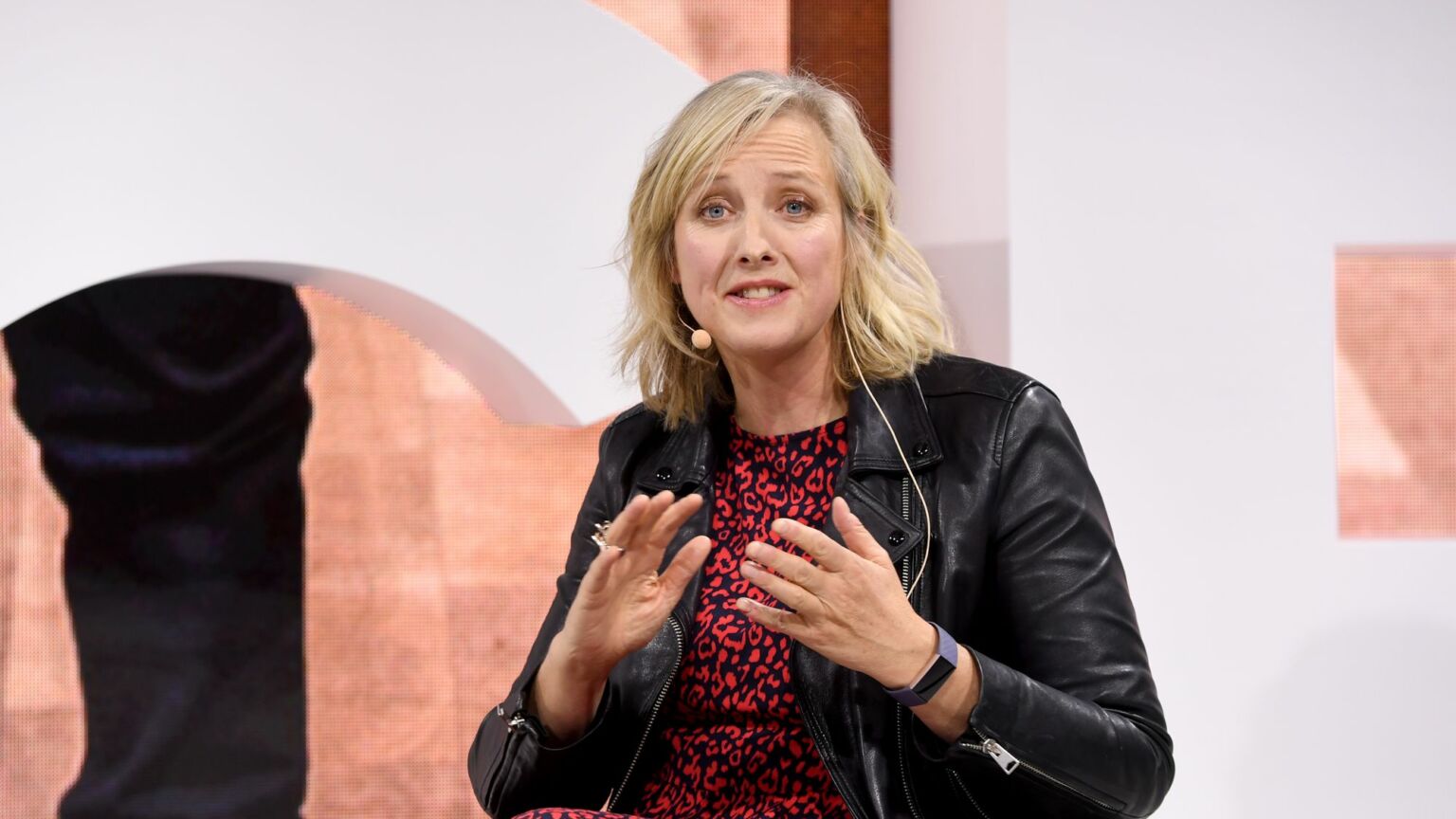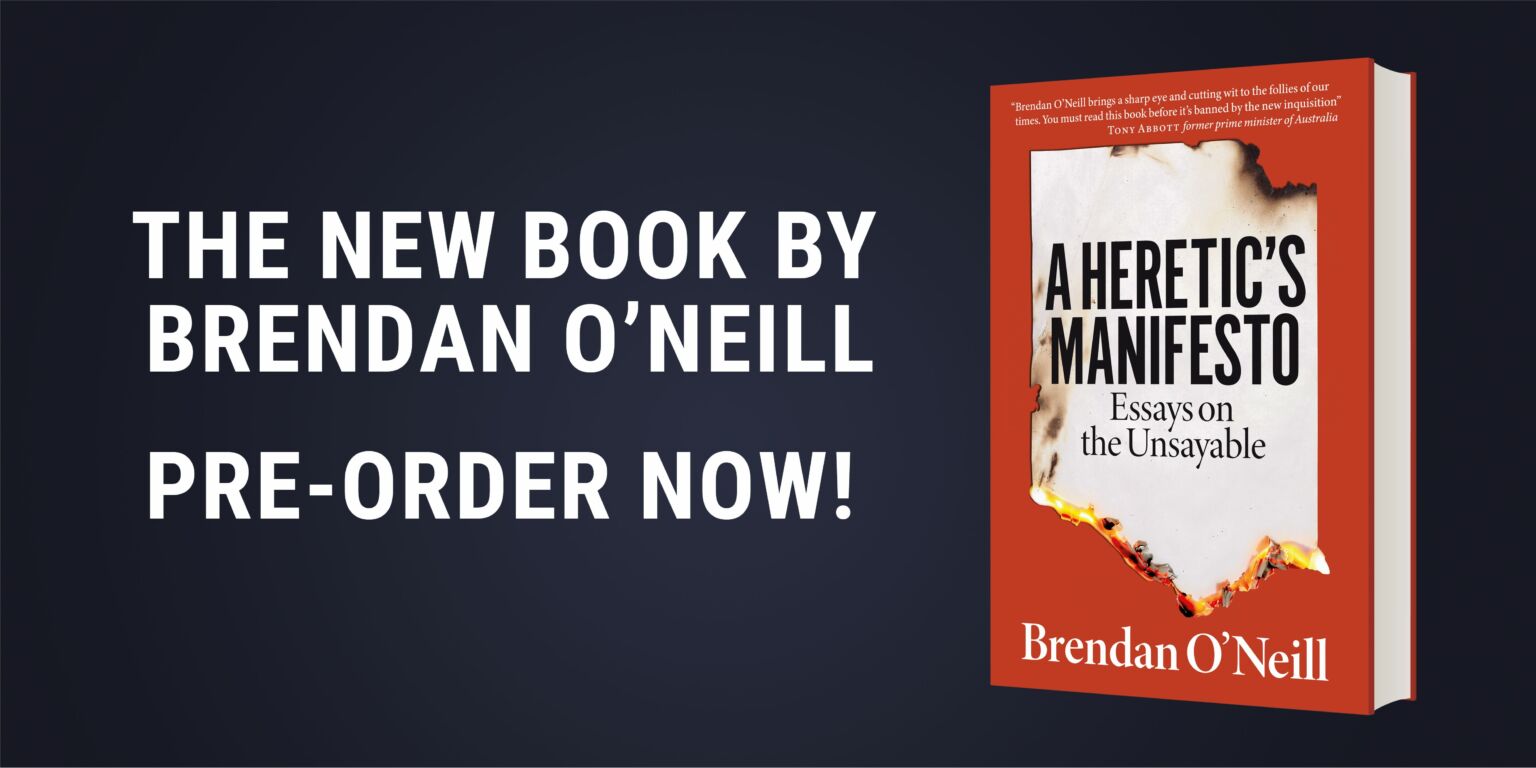The tragedy of Carole Cadwalladr
How Brexit Derangement Syndrome drove the middle classes mad.

Want to read spiked ad-free? Become a spiked supporter.
Do you remember when respectable society went batshit insane? It was after the Brexit vote. Overnight, the kind of people who pride themselves on being cultured and measured became emotional wrecks. You’d see them in Westminster, on Remoaner marches, their blue-painted faces streaked with tears. They swapped Saturdays at the Curzon Soho for Saturdays in Trafalgar Square, where they’d rage against the ‘gammon’ who took us out of the EU. I remember seeing a Boris lookalike and a couple of women draped in EU flags doing an am-dram reenactment of Brexit – you know the drill: Boris lied, the country died – and thinking to myself: ‘That’s it – they’ve lost the plot.’
I saw a man in an EU-coloured skirt dancing to house music while middle-aged Guardianistas whooped and cheered. There was EU supergirl and her dog. There was Steve bloody Bray, who’s still there, barking into his megaphone like a latter-day Bedlam patient. Masks slipped. Prejudices normally only uttered in the sanctum of a dinner party exploded into public view. Marchers boasted about having ‘properly spelt placards’ – they’re cleverer than you northern imbeciles, you see. And of course there were conspiracy theories. Lots. Russian bots made Brexit happen, they said. Shady billionaires puppeteered the whole thing, they claimed. Paranoia was everywhere.
It was the middle-class meltdown to end all middle-class meltdowns. And at the heart of it all was a writer for the Observer called Carole Cadwalladr. Poor Carole. Her articles were – let’s be frank – mental. It was like David Icke and Kath Viner had a baby. Brexit was brought about by a ‘shadowy global operation’, her pieces said. There was a lot of ’dark money’ involved, she insisted. There is an ‘elite dining society’ made up of journalists and politicians, and it’s the ‘secret club of people who rule Britain’, she declared. So horrified were the chattering classes by Brexit, by the audacity of working-class voters to defy their betters and vote Leave, that they convinced themselves some evil mastermind must have been behind it. Maybe it was Putin. He’s one of the shady ones who’s been handed a ‘golden Willy Wonka ticket to manipulate hearts and minds’, said Cadwalladr. To which the only reasonable response is: ‘Eh?’
What became of Ms Cadwalladr? Nothing good. This saint of the #FBPE religion has been slapped with a one-million-pound bill following her libel clash with Brexit campaigner Arron Banks. It’s complicated, but in essence Ms Cadwalladr said in a TED talk in April 2019 that Mr Banks lied about ‘his covert relationship with the Russian government’. Banks said her comments were ‘false and defamatory’ and he sued her. The court found in Ms Cadwalladr’s favour on the narrow basis that she had a ‘reasonable belief’ that her comments were in the public interest. Then the Court of Appeal partially reversed the judgement, arguing Ms Cadwalladr’s comments were defamatory because they were unsubstantiated. And she now has to pay legal costs of around £1.2million. Ouch. This feels like the nadir not only of Cadwalladr’s feverish pursuit of Banks, but also of the broader metropolitan freakout over Russian meddling, dark cash, etc etc.
How should we respond to Cadwalladr’s strife? It’s tempting to smirk. Brexiteers have been on the receiving end of bile for seven years, so why shouldn’t we derive a little pleasure from the legal reprimand of one of our tormentors? Here’s why. Schadenfreude is always a cheap, unfulfilling emotion, but particularly so in this case. First, because the ruling on Cadwalladr could have a chilling effect on press freedom. And second because the right’s singling out of this one woman as the great misspeaker on Brexit risks distracting attention from the broader establishment meltdown over Brexit, and just how destructive that meltdown was.
We can all understand why Banks felt aggrieved by Cadwalladr’s comments. No one likes hearing things about themselves that have no basis in evidence. And yet it surely comes with the territory of the free press that hacks will sometimes make mistakes. That as part of their investigations they will occasionally arrive at conclusions that aren’t entirely right. Without that leeway to be wrong, won’t journalism suffer?
English libel law is an infamously crude instrument. In elevating the protection of individual reputation over the liberty to speak – yes, including the liberty to speak in honest error – it acts as a Stop sign to journalistic risk-taking. Call me a free-speech absolutist, but I would rather live in a world where journalists feel free to express honestly held ideas about Ruskie plots than one where they fear doing so on pain of being hit with an eye-watering bill for defamation. This is not to say Banks should just accept everything that’s said about him. But there must be a less expensive, less punitive way for citizens to take to task writers or publications that say unsubstantiated things about them.
The other problem with Cadwalladr’s million-pound wrist-slap is that it threatens to personalise the post-Brexit hysteria. It makes it a Carole problem rather than an establishment problem. My main emotion towards Cadwalladr these days is actually pity. I can’t help wondering: where were her friends and colleagues as she descended ever further down the rabbit hole of Brexit conspiracy theories? Where were her editors? Why did no one at the Observer say: ‘Carole, this bit on the “psychological warfare” behind the votes for Trump and Brexit – what the hell are you talking about?’ Why didn’t anyone tell her to stop tweeting? Why didn’t someone stage an intervention?
We know why. Because there’s a layer of polite society that vicariously relished her one-woman war against Brexit and Banks and the gammon. Furious with the electorate, sections of the middle classes pushed Cadwalladr to make ever-more bonkers assertions about how Brexit came about. They retweeted her in their tens of thousands, funded her legal cases, even gave her the Orwell Prize. They green-lit her manic journalism in the hope that it would turn up something – anything – that might prove they were right and the dunces of the Red Wall were wrong. There was a cruelty to this; this goading of a reporter to obsess over a conspiracy that clearly never existed.
There are two victims here: Banks and Cadwalladr. He was unfairly maligned by the irate chattering class; she was used by them. There’s a third victim, too: democracy. Cadwalladr’s fundraiser for her legal fight against Banks was called ‘Democracy: The Fight Back’. It’s like a sick joke. The #FBPE lunacy of which Cadwalladr became unwitting queen was a fight against democracy, not for it. Yes, Cadwalladr’s supporters should help to pay her legal costs – it’s the least they can do. But, after that, I beseech you, get on with your lives. Forget about Brexit. Just stop.
Brendan O’Neill is spiked’s chief political writer and host of the spiked podcast, The Brendan O’Neill Show. Subscribe to the podcast here. His new book – A Heretic’s Manifesto: Essays on the Unsayable – is available for pre-order on Amazon UK and Amazon US now. And find Brendan on Instagram: @burntoakboy
Picture by: Getty.
Who funds spiked? You do
We are funded by you. And in this era of cancel culture and advertiser boycotts, we rely on your donations more than ever. Seventy per cent of our revenue comes from our readers’ donations – the vast majority giving just £5 per month. If you make a regular donation – of £5 a month or £50 a year – you can become a and enjoy:
–Ad-free reading
–Exclusive events
–Access to our comments section
It’s the best way to keep spiked going – and growing. Thank you!










Comments
Want to join the conversation?
Only spiked supporters and patrons, who donate regularly to us, can comment on our articles.